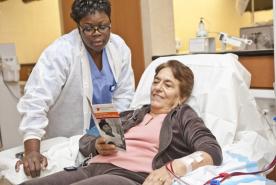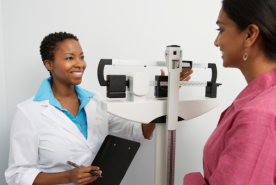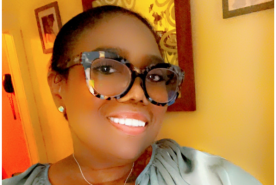August 16, 2022
Ansara Piebenga is the parent of a child kidney transplant recipient. Elizabeth Fortune has spent the last eight years on dialysis. What do they have in common? Neither felt like they had any control at the start of their kidney journeys and now they feel confident in working with their clinicians to be informed about their kidney care.
Two rare diagnoses
Ansara's baby was born seemingly healthy, but she began crying, vomiting, and losing weight four months after birth. Tests later revealed that she had stage 3 kidney disease.
"We found out that she was going to need a kidney and liver transplant because of her rare genetic disorder," said Ansara. "She got a g-tube and her hemodialysis catheter. It was one of those situations that just shocked us and we just set out on the course."
Elizabeth, on the other hand, was being treated for cancer when she learned her chemotherapy treatments caused her kidney failure.
"I was in the hospital and my oncologist walked in one day and said, ‘you have got to start dialysis,’'' said Elizabeth. "When I got home, the doctor started talking to me about peritoneal dialysis, and together we made that my goal."
Understanding the pros and cons of treatment
Ansara and Elizabeth both believe their clinicians had their best interests at heart but felt out of the loop and disconnected from the decisions being made.
Ansara, for one, felt like she didn't have a solid plan or understand what was happening at each stage of her daughter's treatment: "I need to know there's an ending to this, so I pushed when she was seven months old, asking what's her plan? That's when we started talking about transplant centers and I could picture the future."
While their daughter's life certainly improved because of the transplant, the Piebenga family was unaware of the challenges that could occur post-transplant.
"For another three years it was very difficult to get her to be stable," Ansara said. "We had viruses, it was really hard adjusting to immunosuppression, and we had a liver rejection issue. All of that was happening post-transplant."
Similarly, Elizabeth wasn't aware of complications she could face from treatment.
"What I didn't understand at the time was that every treatment, including chemo, dialysis, and transplant, has its pros and cons," said Elizabeth. "When I started dialysis, I thought it was going to cure me. Then I thought I'm going to get a kidney and my life is going to be great. Well, eight years later, that's not exactly the path life has taken."
While Elizabeth wouldn't have made a different decision regarding PD, she does wish her doctor had given her the entire picture instead of only talking about the benefits.
"He really talked about the pros and getting your life back. You hook up at night, sleep, pop off the machine, and you live life," said Elizabeth. "I didn't realize 8 hours would eventually turn into 10 or 12. There are some of these drawbacks to PD that I didn't understand at the time when I made the decision. It's not a decision that I would have made differently but I am a person who wants to make a decision based on the pros and cons."
Making shared decisions
Both began to advocate for themselves and their families, ask questions, and communicate their needs to the practitioners in order to receive the information they needed to make the best decisions possible.
"I had such a small baby and she was ill, so I learned very quickly to advocate for her. A part of me just woke up and I started to ask questions," said Ansara. "That was my baby and I was not going to let things go wrong. I think our physician learned quickly that we are a family that really needs to know."
As her daughter got older, Ansara and the healthcare team made sure she was part of the decision-making and allowed her to become a participant in her care.
"I think, for pediatrics, the patient needs to be involved so that when they do eventually transition into adult care, they're not completely lost," said Ansara. "Now, my daughter really does completely take care of herself. I encourage physicians to impart that knowledge to caregivers early on: Their job is to not have a job and have the patient take care of themselves."
While the Piebenga family's care team quickly learned how to communicate with them, Elizabeth found a new nephrologist who practiced a more patient-centered care approach.
"She taught me that you do dialysis to live, not live to do dialysis. I know the doctor always knows best medically and I always want to listen to her but it is important she also listens to me,” said Elizabeth. “I may not always get my way with how my dialysis is going, I walk away feeling like [my doctor] is making that decision based on what I've told her."
We believe that care is a two-way street. By working with their physicians, Ansara and Elizabeth now feel they can make more informed decisions that positively impact quality of life for themselves and their families.
Get the latest in kidney research and treatment
Join us as we highlight the latest in kidney research, bring you up-to-date on kidney care, and answer questions from patients to help them live well with kidney disease or a transplant.
Subscribe to Hot Topics in Kidney Health.









